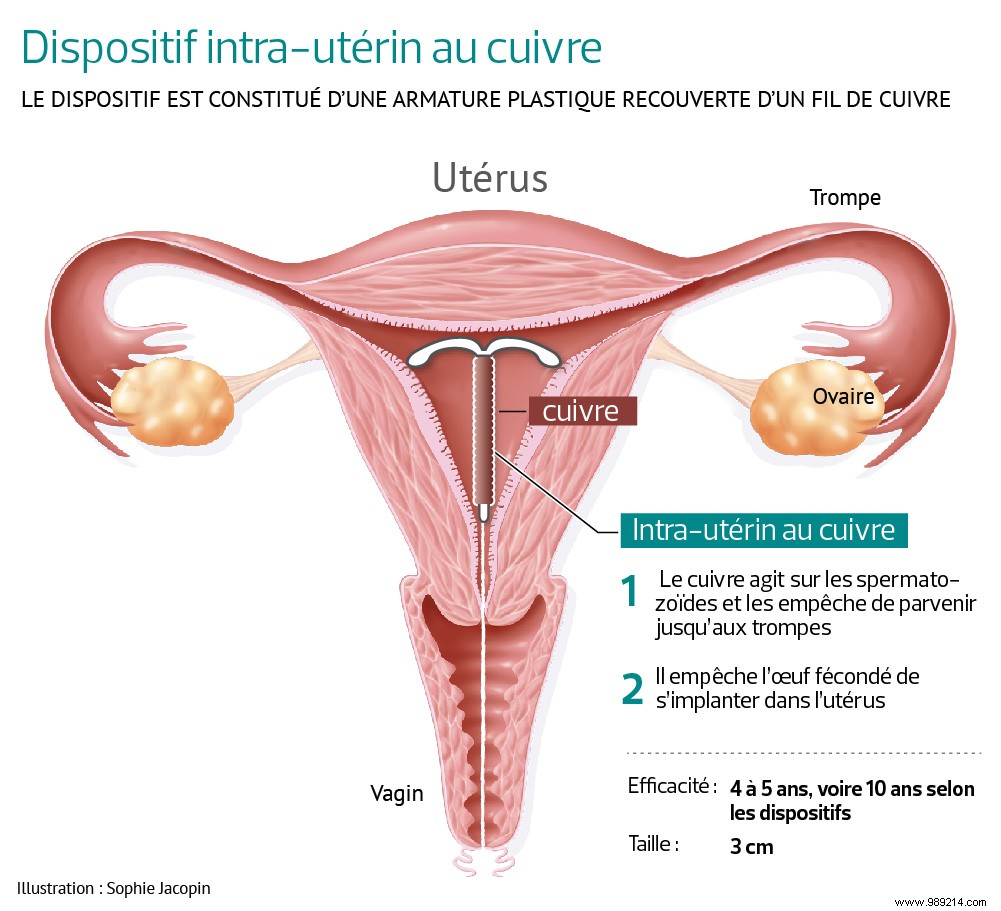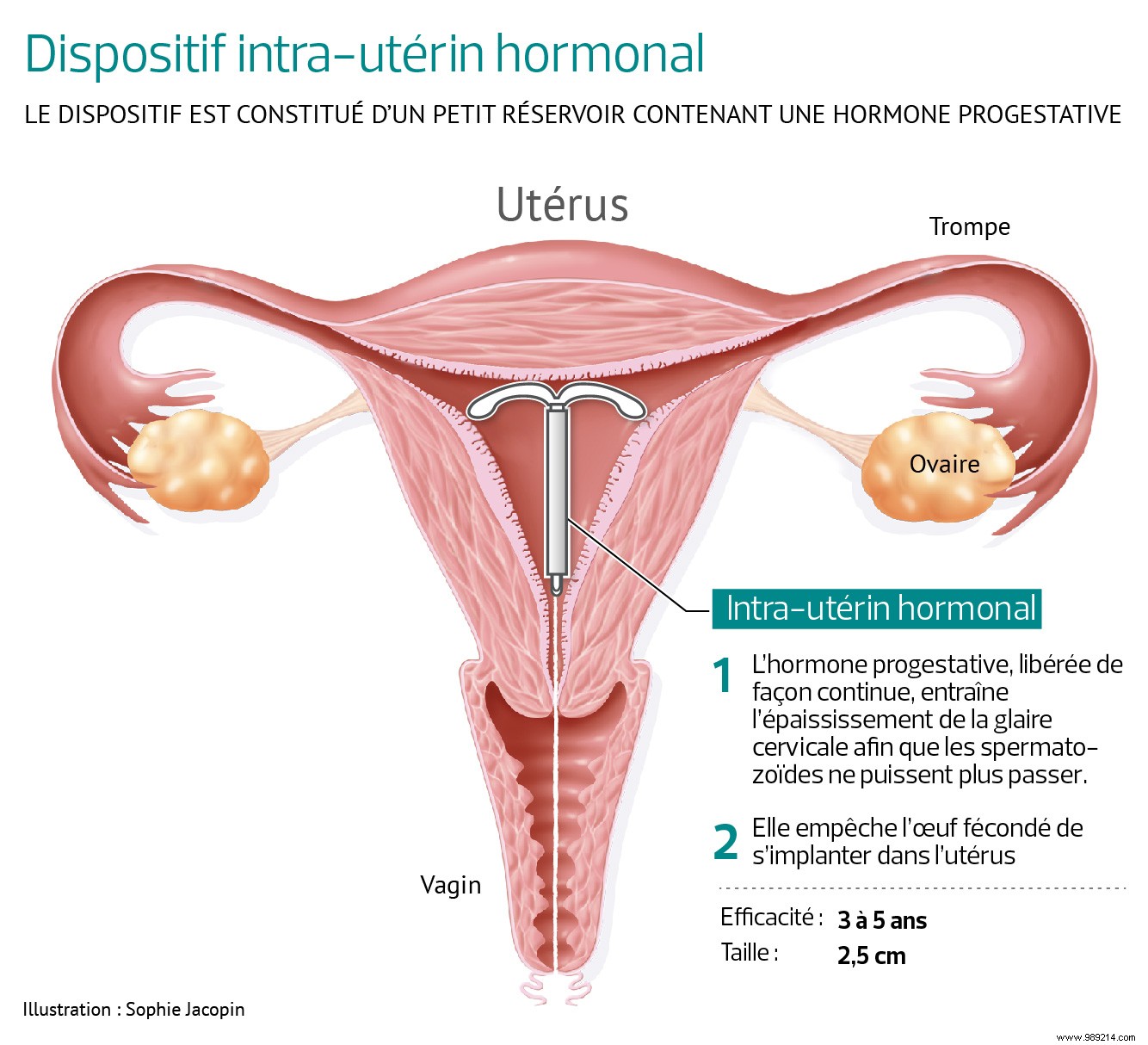
"Get an IUD inserted, you'll be safe!" ". What woman has never heard this phrase repeated by someone close to her? Needless to list them, the disadvantages of the menstrual period, we know! But what effective contraception can prevent these painful periods for some? Or too abundant for others? Or how to protect yourself effectively and in the long term? During this kind of questioning, the IUD attracts all desires and is always in the forefront. It's normal ! It is now the second most used contraceptive method among women. Yes but why ? What is its use and method to achieve so many votes?
Contents 1 The copper IUD or IUD (intra-uterine device):the natural advantage and without hormones in addition! 1.1 Ok, but what are its advantages? 1.2 And its disadvantages then? Yes because there is! 2 The IUD or hormonal IUD:the satisfaction of good body regulation! 3 Its advantages? Let's talk about it ! 4 So, what are its disadvantages? 4.1 And you, what will be your choice?Focus on the two forms of IUDs that coexist:copper and hormonal . Which steals the show? We explain!

The copper IUD is actually entirely made of plastic and partially coated with copper. His method is simple:it inactivates sperm by releasing copper oxides, which makes them unable to fertilize the egg, and induces a small local inflammatory reaction that prevents the implantation of a possible embryo. Its effectiveness rate is 99.2% according to the World Health Organization (WHO).
Its first advantage, which is not negligible, and which even becomes a major asset for some, is that it respects the natural course of menstrual cycles since it does not release any hormone likely to disturb the proper functioning of the body.
So you dread taking hormones? With the extra pounds and the disruption of your body (headaches in some women, presence of cysts or tumors…):this IUD will make your life easier.
It can be laid in almost all women. The rule that states that it is mandatory to have had children to have one, is totally false. However, young women whose uterus is still completely intact will be offered the “short” version, i.e. small models adapted to the uterus of young nulliparous girls (who have not yet had children). It can also be used as emergency contraception (catch-up).

Who says copper says without any hormones. It therefore does not reduce the volume of periods or premenstrual syndromes. Are you a fan of bloating, headaches and painful periods, mood swings and fatigue, before, during and after your period? With the copper IUD, don't even think about it:you'll still be good at reacting to the vagaries of the female body!
Another disadvantage, and not the least:it can, in some cases, increase the volume of the rules considerably!
To think about!
This specimen, all plastic, contains a tiny reservoir (don't panic!) which continuously releases hormones derived from progesterone, levonorgestrel, like or close to the pill to be ingested. This diffuses on the wall of the uterus and prevents the mucous membrane from developing excessively.
No fertilized egg can therefore implant there. Its effectiveness rate is 99.8% according to the World Health Organization (WHO).
Unlike its copper counterpart, it significantly reduces the volume of rules, and sometimes even eliminates them. Some gynecologists prescribe it without contraceptive purpose to women who suffer from very heavy or painful periods. Ciao pre-menstrual syndrome! With hormones, your body no longer regulates naturally and forces itself to adapt, for your greatest pleasure...or not!
Alongside the well-known standard format (Mirena), there has also been a mini format since 2014, marketed under the name Jaydess.
Thinner and shorter, the latter only releases 5 to 13.5 micrograms of hormones per day, compared to 10 to 20 micrograms for Mirena. A good compromise if you are not a fan of hormones!

Apart from the "for or against" hormones, it still has some other disadvantages that should not be overlooked:the absence of periods can disturb some women, who are more reassured to have them. In addition, it has undesirable effects:risk of irregular and unpredictable bleeding, weight gain, outbreak of acne and hairiness in predisposed women . A packaging favored by taking hormones!
Not to mention the many disturbances never notified before, but recently reported by hundreds of women carrying a Mirena (depression, anxiety, dizziness, hair loss, heaviness in the lower abdomen …).
The choice is yours!
But nothing is definitive:depending on your first choice, speak with a healthcare professional and know that it is entirely possible in both cases to go back! Although IUDs are designed to protect against long-term pregnancy (5 to 10 years for copper IUDs and 3 to 5 years for hormonal devices), they can be removed at any time if desired. or in case of excessive side effects.
****
